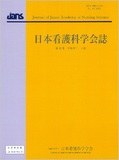Japanese
English
- 販売していません
- Abstract 文献概要
- 参考文献 Reference
要旨
目的:統合失調症者における自伝的記憶の実態から,記憶の判別機能であるリアリティ・モニタリングの特徴を明らかにすることを目的に研究を行った.
方法:対象者は急性期病棟に入院・治療中の統合失調症者20名で,調査内容は対象者背景に加え入院や病気の状況に関する体験記憶の想起を糸口とした半構造化面接を実施し,内容分析を行った.
結果:対象者は男女10名ずつであった.語られた自伝的記憶は,130のコードから22のサブカテゴリが抽出され,最終的に【自分ではよくわかっている】【どうしたら良いか戸惑った】【私は病気だ】【信じてもらえない】【受け入れたくない】【もっと良くなりたい】【私らしくいたい】の7カテゴリが抽出された.
結論:統合失調症者は推測・想像優位のリアリティ・モニタリングが働きやすい特徴をもちながらも,知覚優位のモニタリングを通じて,現実的・客観的に自身の記憶をとらえている状況が確認された.
Purpose: This study aims at clarifying the characteristics of reality monitoring, which is a function to distinguish memories, based on the actual autobiographical memories held by patients with schizophrenia.
Methods: The study participants were 20 patients with schizophrenia who were hospitalized and treated in an acute care ward. In addition to their background, we asked about how they remember the experience of being hospitalized and their condition around that time before transitioning into a semi-structured interview with each of them. We then analyzed the contents of the narrative data.
Results: The participants were 10 males and 10 females. We found 130 codes in the autobiographical memories told by them, which we grouped into 22 subcategories, from which seven categories were finally identified: I understand myself well; I didn't know what to do; I am ill; No one believes me; I don't want to accept my illness; I want to be better; and I want to be me.
Conclusion: Although patients with schizophrenia are characterized by having a tendency of speculation- and imagination-dominant reality monitoring, situations were confirmed where they also see their memories realistically and objectively through perception-dominant monitoring.
Copyright © 2023, Japan Academy of Nursing Science. All rights reserved.


